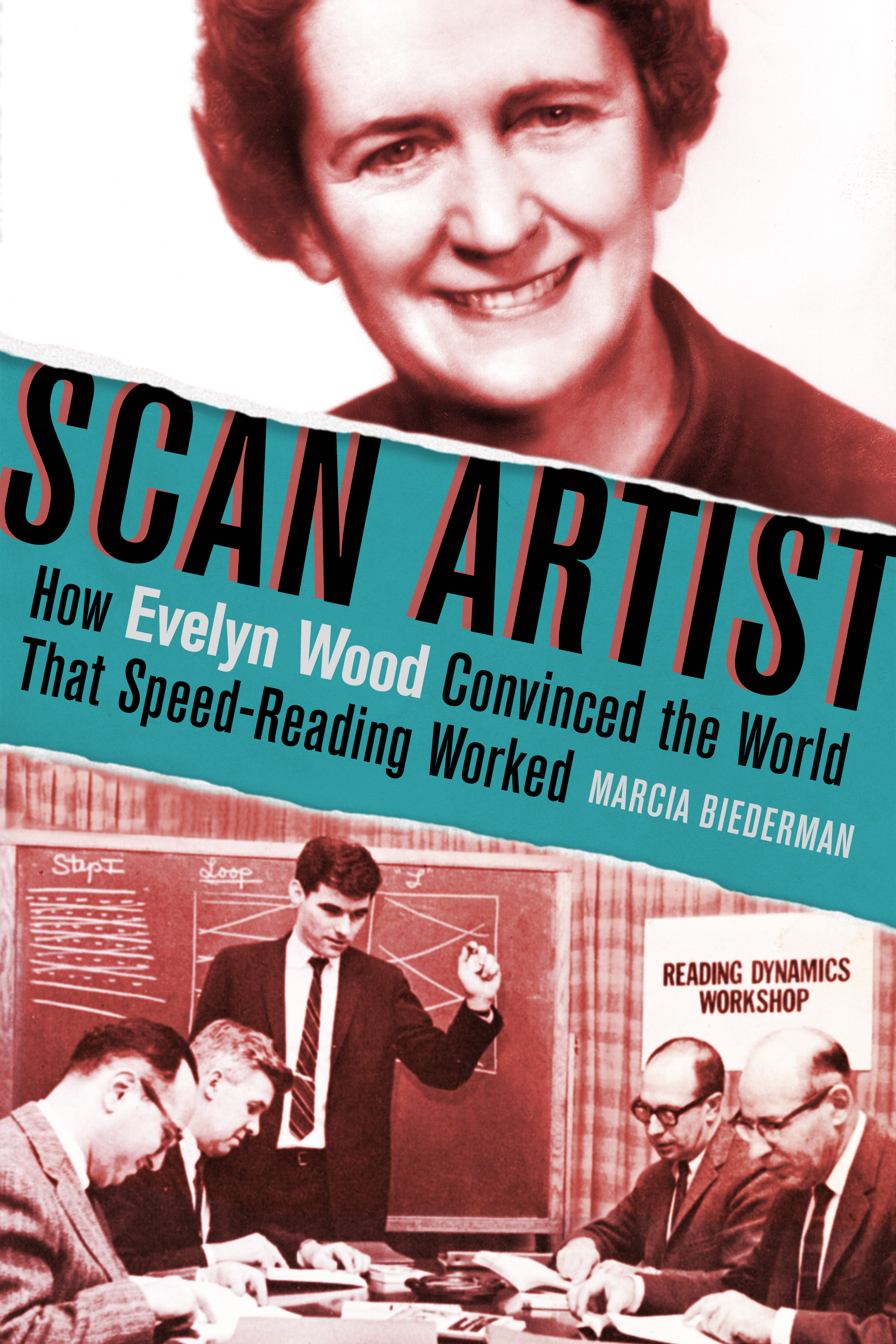As apps and online courses attempt to spark a speed-reading revival, Scan Artist by Marcia Biederman takes an engaging look at Evelyn Wood’s rise from mission worker to marketer and exposes the pitfalls of wishful thinking. “The most famous reading teacher in the world,” as television hosts introduced her, Evelyn had little classroom experience, no degrees in reading instruction, and a background that included work at a Mormon mission in Germany at a time when the church was cooperating with the Third Reich. Nevertheless, a nation spooked by Sputnik and panicked by paperwork eagerly embraced her promises of a speed-reading revolution.
In the interview below, author Marcia Biederman divulges how she researched and uncovered so many dark truths about the best-known educator of the 20th century.

When did you first learn about Evelyn Wood and what was your initial impression of “the most famous reading teacher in the world”? How did your opinion of Evelyn change over the course of writing this book?
As a college student overwhelmed by reading assignments, I was the perfect mark for the Evelyn Wood ads, which then were everywhere. I took a course, but despite doing all the classwork and homework, I never kicked into high gear. The instructor had us flip madly through a book as we swirled our fingers over the lines. I managed to glimpse some random phrases I could later jot down on outline charts. That’s not reading.
I had long suspected that Evelyn Wood’s method was fraudulent. By writing this book, I learned what made her such an effective fraudster. I don’t admire her, but she fascinates me.
There were a lot of shocking moments in Scan Artist, from Evelyn’s ridiculously inaccurate test results and claims made public, to the dark, twisted secrets of her private life. What were you most surprised to uncover in your research?
I was amazed that Wood, an American, had cooperated with Nazism. From the summer of 1938 until the invasion of Poland in 1939, she and her husband led a Mormon mission in Frankfurt, Germany. At the time, the Church of Jesus Christ of Latter-Day Saints was ingratiating itself with the Third Reich, and the Woods got prime seats at the ’38 Nuremberg rally. Evelyn rewrote religious lessons to Nazi specifications, while her husband ignored pleas for help from a church member who’d converted from Judaism. She said it was “good training” for her to bite her tongue when Germans went overboard with their praise for Hitler. It certainly was good preparation for her promotion of a reading method that couldn’t fulfill its promises.
As you explain in Scan Artist, speed-reading courses have been around since the 1930s, and many more seem to pop up daily. What do you think it was about the Evelyn Wood Reading Dynamics institute that made them become so much more popular and successful?
Evelyn was the ultimate show woman, staging demonstrations of her method that wowed the media. It also helped that she launched her course in Washington. Among the first graduates were several US senators who announced on national TV that they could now read at outrageously high speeds. Major news outlets swallowed it whole. Seizing the moment, Evelyn Wood Reading Dynamics expanded rapidly, signing employees to noncompete agreements and crushing the fragmented competition.
Evelyn managed to successfully con everybody and then quietly slip away. Even now, most people still seem to think of Evelyn Wood as a charming schoolteacher. Why do you think the public seems to have overlooked and forgotten the speed-reading scam and this antihero’s dark past?
Middle-aged, white, and presenting herself as a schoolteacher, Evelyn seemed harmless. Moreover, the courses were expensive, and people don’t like to think they were duped. Exit tests were rigged to show progress, and there was an emperor’s-new-clothes effect: lots of people claimed the system had worked for them, so no one wanted to admit–even to themselves–that they’d failed. Plus, it could be dangerous to speak up. The leader of a group called Students Against Evelyn Wood was threatened with a defamation lawsuit. Newspapers that gave skeptics a platform could lose substantial advertising.
What do you hope readers will take away from reading Scan Artist?
I hope readers will come away with the courage to question trends, even when admired celebrities or political figures are into them, and demand more than anecdotal evidence. The defense for all quackery is “I know someone for whom this worked.”
What five people—living, dead, fictional or nonfictional—would you have over for a dinner party and why?
Louisa May Alcott, because Little Women inspired me to write; Oscar Wilde and Nora Ephron for their wit; Lorraine Hansberry and Ida B. Wells, to hear what they think of the world today. I would promise not to speed-read any of their works.
No Comments
No comments yet.